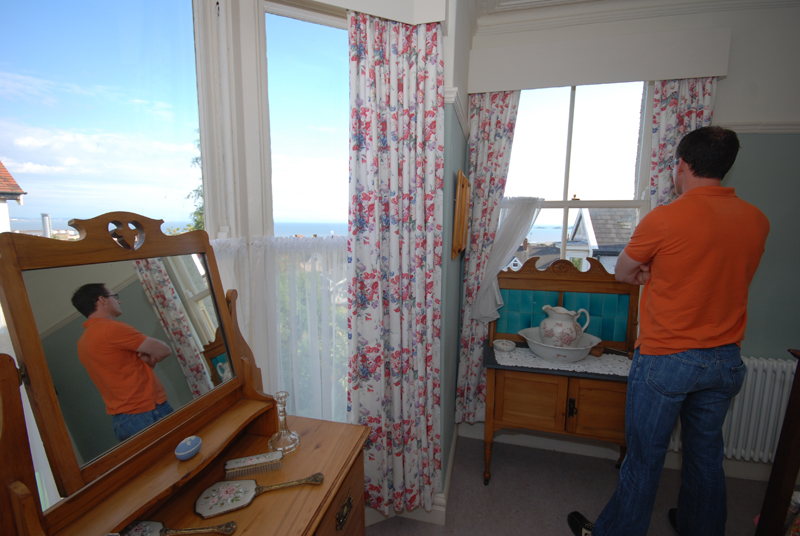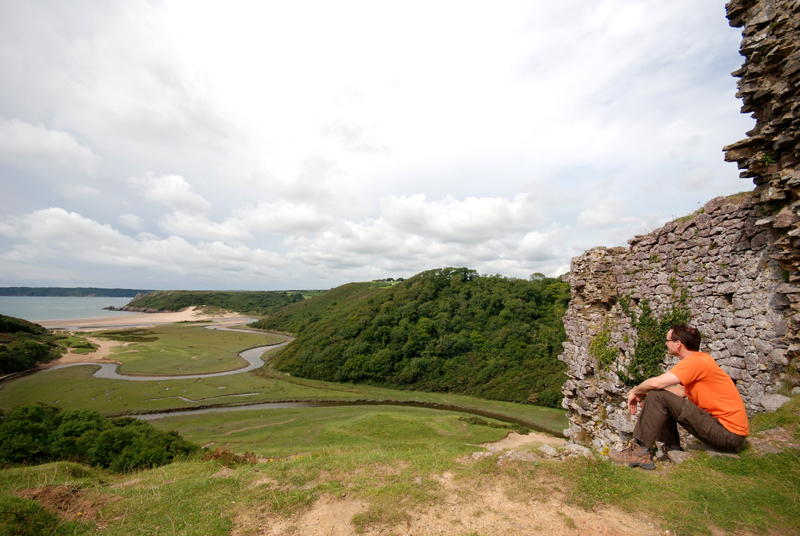To me, Dylan Thomas has always been a monumental figure. The sheer originality of his word usage was intimidating and sometimes difficult to approach. He was also a poet whose facade of unruly drunkenness could overshadow the importance and originality of his work. So much of his life was shrouded in “official myth” that it was difficult to see the person behind it.
Thanks to our friend John Wake, we were able to visit the house at 5 Cwmdonkin Drive, Swansea where Dylan spent the first 23 years of his life, and where he wrote two thirds of his published work.
The home has been carefully restored to it’s 1914 condition by current owners Annie and Geoff Haden. “It isn’t the original furniture, of course,” Annie told us. “But we spoke with the Thomas’s cleaning lady and we tried to get the same type of furniture, in the same places, and the same colours on the walls. She cried the first time she came here because it was so close to what she remembered.”
Annie showed us the room at the front of the house where Dylan was born, and the tiny bedroom where he spent so many nights dreaming up his lyrical verse. But the greatest surprise awaited us at the back of the house, from a window in his parent’s room.
When I leaned my elbows on the sill and put my nose against the glass, the row houses at the bottom of the hill formed a level horizon against the waters of Swansea Bay, revealing the origin of that strange line in Dylan’s poem about boats bobbing across the rooftops.
“No one could figure out where in the house it was written until we found this window,” Annie said. “It had been blocked up by later tenants, but one day a piece of plaster fell out. It was like the house wanted it to be found…”
The key to so many of Dylan’s images came to life there in a middle class neighbourhood on a steep hill in his “ugly lovely town.”
The next morning photographer Simon Vaughan and I hiked out to Three Cliffs Bay on the Gower Peninsula, where a broad sand beach is guarded by a triple-pointed crag of rock. We climbed the hill to the ruins of Pennard Castle, where we talked about life and literature just as Dylan and his friends did in a vanished age of bygone lives. The only thing we didn’t have was a bottle.
The wind blew across the sand and ruffled the tendrils of a textbook oxbow river far below, carrying with it the smell of horses. I thought about how many times I did the same thing in my small town youth. Like Dylan, we sometimes hiked to a quiet spot and sat up all night, sharing secrets in gentle voices and talking about how one day we would escape this life that caged us in. We burned with a desire to journey into a wider world we hadn’t even begun to understand. Life must have looked so simple to Dylan then, before the coming of fame and admirers and the struggle to support a legend no one could possibly have lived up to.
Walking through these scenes of Dylan’s early years humanized him in a way a biography never could. I began to relate to his life, and it opened a new gateway into his work. It was another of Wales’s unexpected gifts.
Photos 2 and 4 © Simon Vaugan 2011





Hey Ryan
Have missed a lot of your writings lately. Always interesting to find out the behind the scenes of about influential figures in your life, i grew up with my parents playing an LP of under milk wood, often find myself saying lines to this day. “no good boyo up to no good with polly garter in the wash house” comes to mind… gets plenty of strange looks. Sad to think there are generations now missing out on their incredible way with language
Yeah, such incredible, musical inventive language. I just read Under Milk Wood again a few weeks ago. We spent some time in Laugharne on that trip as well, and visited Dylan Thomas’s boathouse. Wales is such a great place to travel, not least for the crazy characters you meet.